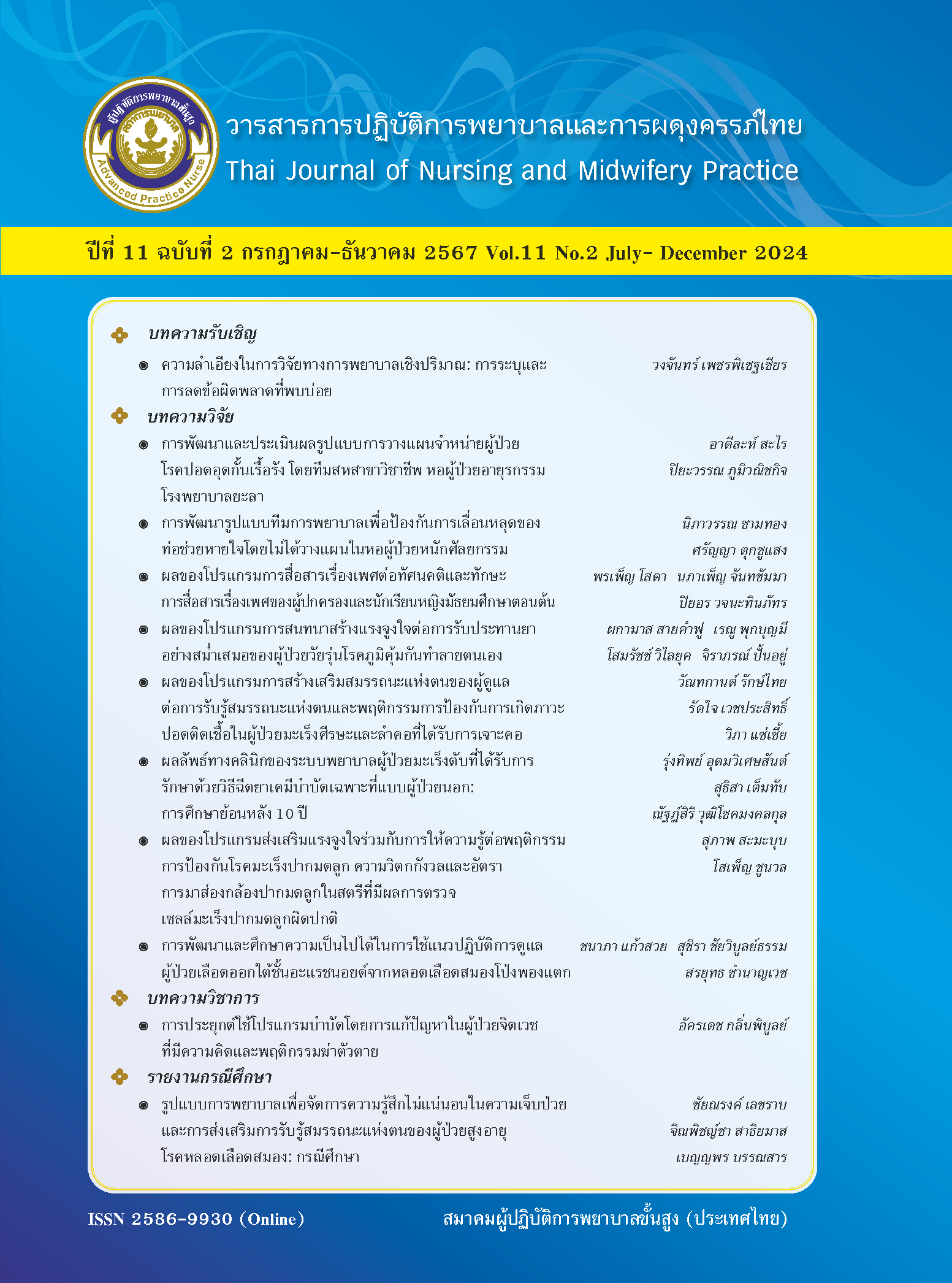Effect of Motivational Interviewing Program on Medication Adherence of Adolescents with Autoimmune Disease
Main Article Content
Abstract
Abstract: The purpose of this one group pre-post quasi-experimental research was to examine the effect of motivational interviewing program on medication adherence of adolescents with autoimmune disease. The conceptual framework for this study was based on self-care theory and motivational interviewing. The program was applied to 17 adolescents who were 15-21 years old with autoimmune disease and poor medication adherence. The study instruments were the motivational interviewing program on medication adherence of adolescents with autoimmune disease. Data were collected using adolescents’ demographic data, Medication Adherence Report Scale (MARS) questionnaire, motivational interviewing record, and medication record. Data were analyzed using descriptive statistics and the medication adherence scores of adolescents with autoimmune diseases were compared using the Wilcoxon signed-rank test. The result of the study showed that after having motivational interviewing program on medication adherence of adolescents, the mean score and median score of Medication Adherence Report Scale: MARS of post-test were higher than pre-test at the statistical significance of 0.05 (Z = -3.634, p <.001). In conclusion, this motivational interviewing program could be used to improve medication adherence in adolescents with autoimmune disease who have poor medication adherence and should be further evaluated over a longer term and compared with a control group prior to applying it to adolescent groups with other chronic diseases.
Downloads
Article Details

This work is licensed under a Creative Commons Attribution-NonCommercial-NoDerivatives 4.0 International License.
References
Opdenakker G, Abu El-Asrar A, Van Damme J. Remnant epitopes generating autoimmunity: from model to useful paradigm. Trends Immunol. 2020; 41(5): 367-78. doi: 10.1016/j.it.2020.03.004.
Samuels H, Malov M, Saha Detroja T, et al. Autoimmune disease classification based on pubmed text mining. J Clin Med. 2022; 11(15). doi: 10.3390/jcm11154345.
Mitratza M, Klijs B, Hak AE, et al. Systemic autoimmune disease as a cause of death: mortality burden and comorbidities. Rheumatology (Oxford). 2021; 60(3): 1321-30. doi: 10.1093/rheumatology/keaa537.
Katchamart W. SLE [Internet]. 2020 [cited 2021 Jun 5]. Available from:https:// www.si.mahidol.ac.th/siriraj_online/thai_version/Health_detail.asp?id=143
Harry O, Yasin S, Brunner H. Childhood-onset systemic lupus erythematosus: A review and update. J Pediatr. 2018; 196: 22-30.e2.
Khowsudhi P. Managing children with joint pain: how to improve outcomes [Internet]. 2021 [cited 2022 Oct 15]. Available from:https://ped.md.chula.ac.th/wp-content/uploads/2021/09/37_CUPA2021-ebook.pdf
Anghel LA, Farca AM, Oprean RN. Medication adherence and persistence in patients with autoimmune rheumatic diseases: a narrative review. Patient Prefer Adherence. 2018; 12: 1151-66.
Eaton CK, Eakin MN, Coburn S, et al. Patient health beliefs and characteristics predict longitudinal antihypertensive medication adherence in adolescents with CKD. J Pediatr Psychol. 2019; 44(1): 40-51. doi: 10.1093/jpepsy/jsy073.
El-Rachidi S, LaRochelle JM, Morgan JA. Pharmacists and pediatric medication adherence: bridging the gap. Hospital Pharmacy. 2017; 52(2): 124-31.
Kabir M. Drug compliance in children with juvenile idiopathic arthritis and reasons for poor compliance. American Journal of Clinical and Experimental Medicine. 2017; 5: 15.
Venditti EM, Tan K, Chang N, et al. Barriers and strategies for oral medication adherence among children and adolescents with Type 2 diabetes. Diabetes Res Clin Pract. 2018; 139: 24-31.
Tan QEC, Gao X, Ang WHD, et al. Medication adherence: A qualitative exploration of the experiences of adolescents with systemic lupus erythematosus. Clin Rheumatol. 2021; 40(7): 2717-25.
Hanghøj S, Boisen KA. Self-reported barriers to medication adherence among chronically ill adolescents: a systematic review. J Adolesc Health. 2014; 54(2): 121-38. doi: 10.1016/j.jadohealth.2013.08.009.
Ramay BM, Cerón A, Méndez-Alburez LP, et al. Factors associated to acceptable treatment adherence among children with chronic kidney disease in Guatemala. PLoS One. 2017; 12(10): e0186644. doi: 10.1371/journal.pone.0186644.
Orem DE, Taylor SG, Renpenning KM. Nursing concepts of practice (6th ed). St. Louis: Mosby-Year Books; 2001.
Phornphibul P. Implementation science: theories, models, and frameworks. TJNMP. 2017; 4(1): 5-12. (In Thai).
Miller WR, Rollnick S. Motivational interviewing: helping people change. New York: Guilford; 2013.
Halterman JS, Riekert KA, Fagnano M, et al. Effect of the school-based asthma care for teens (SB-ACT) program on asthma morbidity: a 3-arm randomized controlled trial. J Asthma. 2022; 59(3): 494-506. doi: 10.1080/02770903.2020.1856869.
Arunsaengsod K, Maneesriwongul W, Pampukdee O. Effect of brief motivational interviewing on knowledge, motivation and medication adherence among patients with hypertention. Journal of Public Health Nursing. 2016; 28(3): 129-44. Thai.
Erikson EH. Identity: youth and crisis. New York: Norton; 1968.
Cohen J. Statistical power analysis for the behavioral sciences (2nd ed.). Hillsdale, NJ: Lawrence Erlbaum Associates, Publishers; 1988.
Horne R, Weinman J. Patients’ beliefs about prescribed medicines and their role in adherence to treatment in chronic physical illness. J Psychosom Res. 1999; 47(6): 555-67.
Rungruangsiripan M, Sitthimongkol Y, Maneesriwongul W, et al. Mediating role of illness representation among social support, therapeutic alliance, experience of medication side effects, and medication adherence in persons with schizophrenia. Arch Psychiatr Nurs. 2011; 25(4): 269-83. doi: 10.1016/j.apnu.2010.09.002. Thai.
Gesinde B, Harry S. The use of motivational interviewing in improving medication adherence for individuals with asthma: a systematic review. Perspect Public Health. 2018; 138(6): 329-35.
Nakhornriab S, Wattanakikrilet D, Charoenkikarm V, et al. The effectiveness of mobile application on medication adherence in patients with stroke. Nurs Sci J Thai. 2017; 35(3): 58-69. Thai.
Badawy SM, Kuhns LM. Economic evaluation of text-messaging and smartphone-based interventions to improve medication adherence in adolescents with chronic health conditions: a systematic review. JMIR Mhealth Uhealth. 2016; 4(4): e121.
Coyne KD, Trimble KA, Lloyd A, et al. Interventions to promote oral medication adherence in the pediatric chronic illness population: a systematic review from the children’s oncology group. J Pediatr Oncol Nurs. 2019; 36(3): 219-35.


